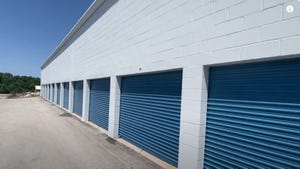June 1, 2006

What has changed? Following 2000-2002, a period of strong expansion fueled by U.K./U.S. developers, the companies that looked at their bottom line and didnt like what they saw reevaluated their plans. Awareness of self-storage services was low in France, so developers had to slow ramp up and proceed cautiously. To reduce construction costs for construction and head offices, they sought better locations and had to keep pace with the market. Those who didnt adapt were sold. The survivors are now ready to expand because the market is thriving. France is already the second-largest European market, and without a doubt, self-storage will be successful.
What didnt change? Most new entrants have difficulty finding sites, insurance and especially financing. Obviously, financial institutions need to accept the industry. Lack of capital has contributed to a situation in which most established facilities are owned by large companies.
Sold!
In April 2005, Une Pièce en Plus bought all French facilities owned by Access, one of the oldest European companies. Seven of the sites were sold by UPP to Armadillo Self-Stockage last summer. Access has disappeared from France, but its English counterpart continues to trade under the name.
Devon Self-storages Lyon and Toulouse sites sold to Homebox in March. The facility in Marseille is expected to be bought by Shurgard.
BoxAvenue, which built only conversions, had six Paris sites and four in the province, nine of which were bought by Shurgard in January. Only Nantes stays independent and trades under the BoxAvenue name.
Shurgard was acquired by Public Storage in March 2005. At the time, Shurgard had 46 facilities in France. The U.S sites will be re-branded Public Storage, but in Europe nobody knows that brand, and even if Shurgard is a weird name no French person can pronounce correctly, it seems the brand will survive here. Before the merger, the company tried to buy a maximum of facilities to boost its numbers. The main challenge now is to be profitable.
Expansion
In August 2004, Safestore bought Bridgepoint, UPPs parent company. The new owner has strong development plans for UPP. Safestore bought the Access sites in Paris, and is focusing expansion on Paris, where it already has 16 sites. The plan is to open one facility a year.
Homebox has 19 facilities throughout Frances largest cities. The company underwent major changes, developing a sort of franchise for all its sites, which is yielding positive results. New facilities are opening under the franchise agreement.
Now Entering ...
Three-year-old Annexx is focusing on developing third-generation sites in the southwest of France. It owns three facilities in Toulouse, one in Bordeaux and another in Perpignan. Construction plans call for three new facilities annually.
Armadillo Self-Stockage shines as the new meaningful entrant. Armadillo was founded in Scotland by Alister Jack, who started Aardvark Self-storage in 1996 and sold it to Mentmore Abbey in the autumn of 2002. Armadillo is his latest star venture. He joined the French market in 2005 with the purchase of seven former Access sites, three in Paris, three in Lyon and one in Nice. Armadillo intends to expand in France.
Flexi Stockage opened its first site a year ago in Argenteuil near Paris. The company, backed by Irish Investors, has plans to open two sites a year in the Paris area.
Small Fries
More small entrepreneurs are interested in developing self-storage in France. The thinking process goes like this: I have this not-so-great (or half-empty) warehouse that Im not sure what to do with. Maybe self-storage is the way to go! But because this business requires lot of capital, few design large, third-generation facilities. Instead, they develop small facilities from 600 to 2,500 square meters. The stores are usually managed as a sideline to a main business.
The French Self-storage Association
The French Self-storage Association has behaved like an elite club. Because it snubs new operators, now it has only three members. Thats 8 percent of all operators, even if the trio represents 68 percent of facilities. The French association has been recently hard-pressed by the European association FEDESSA to change its policy and accept small operators. The change will be difficult but necessary if the association wants to regain credibility and true representation.
Whats Next
Frances population is roughly equal to that of the United Kingdom. According to a recently released Steel Storage study, the U.K. market boasts 976 facilities with more than 100 new ones opening annually. France, with its 138 facilities, is ripe for self-storage. The service is well accepted by the French, but remains five years behind the United Kingdom. Self-storage is a business that blossoms slowly; it takes time for product awareness to grow.
Lately, midsize U.K. operators have shown keen interest in expanding their business into France by acquiring existing facilities; however, what was for sale has been sold. They will have to wait a couple of years before new opportunities arise.
Philippe Peyrot is president of Annexx SAS, a self-storage company based in South France, and founder of www.Self-Stockage.info, an online magazine focusing on self-storage in Europe. For more information, visit www.annexx.com.
News From Around The World
Storage Firm in Expansion Move Across Northwest
Smart Storage, based in Wirral near Liverpool, U.K., will extend its business across the Northwest after securing a £2 million investment from venture capitalists. The company, which launched in January 2005, aims to have five sites operating by the end of 2007, according to blackenterprise.com. Among the most popular tenants are solicitors and accountants looking to archive documents, and homeowners. The third phase of the Wirral site in New Chester Road, Bromborough, has just opened and a fourth is in the pipeline. Plans include 600 storage units covering more than 33,000 square feet of space.
New Firm in Store
A new self-storage business is set to open at a factory site in Slough, London, reported The Slough Observer. Slough Trading Estate has agreed terms with leading specialist Safestore to develop a new facility on the estate to open this autumn. Safestore plans to outfit the building with 54,000 square feet of storage space over four floors. A brick-and-glazed facade will complement the trade park next door. With more than 74 stores in the United Kingdom, Safestore is the market leader and No. 2 in Europe. The newspaper reported the U.K. self-storage market is growing annually by 25 percent to 30 percent, and one in 170 households uses self-storage.
Its Unlucky Seven for Big Yellow
Angry Lewisham, London, neighbors saw red when the Big Yellow Self Storage Co. tried to build a large warehouse near their homes for the seventh time, reported icSouthLondon. In its latest planning application, the company tried to disguise the warehouse by designing a row of homes alongside the building wall that faces two main roads. The committee unanimously voted to refuse planning permission. The company may appeal.
More bad news for Big Yellow in Bromley, London. In March, the company was handed fines and costs totaling £1,000 for willfully obstructing the highway, reported The Bromley Times. The company illegally placed its advertising boards on the grass verge near its premises in St. Mary Cray.
Pineapple Cocaine Gang Gets 122 Years
In a recent sting, seven drug smugglers were caught sticky-handed at the Big Yellow Self-Storage Co. in West Norwood, London, according to icSouthLondon. British cops were lying in wait at the storage depot to ensure the criminals were snared before they could fritter away the proceeds of their multimillion pound plot. The drug smugglers, who imported £3.5 million of cocaine inside pineapples, were sentenced in March to 122 years. Customs officials found the dodgy batch and hid tracking devices among the fruit.
You May Also Like





